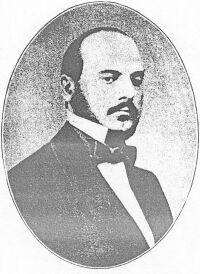
J. B. ARBAN
JEAN BAPTISTE ARBAN was born on February 28th, 1825, at Lyons, France, and died April 8th, 1889, at Paris.
Arban was called a dreamer in his day, but by his musical ideas and artistic practice he made the cornet a solo instrument equal in popularity, even then, to the flute, clarinet, violin and the voice.
Throughout his tours through France, Germany and England, he pleaded the cause of the Cornet and proved that his instrument could compete with the most popular instruments.
In 1848, he played, before the Societe des Concerts du Conservatoire, the famous air composed for flute by Boehm, on a Swiss theme, comprising an intentional combination of the most inextricable diffilculties. The flute tonguing in this piece he performed in double staccato, also the treble staccato of triple tonguing and thereby won the distinction of being the first cornet player to have applied triple tonguing to the cornet, as he claimed triple tonguing is precisely the same as the systems used for playing the flute. On that day, Arban claimed, the cornet took its place among classical instruments.
Arban was appointed professor of the cornet of the Paris Conservatory in 1857, and in 1864 his method was first published. The directors of the conservatory made the following report regarding the adoption of his Cornet Method as the Standard Instructor:
"The Committee of Musical Studies in the
Paris Conservatoire has examined the Method which has been submitted by
Mr. Arban. This work of sensible development is founded on excellent principles,
and omits no teaching essential to the making of a good cornetist. It is
really a resume of the knowledge acquired by the author's long experience
as a professor and executant, and also the exceptional results which have
marked his artistic career. In this wealthy mine of instruction, where
all musical questions are treated, we can readily observe M. Arban's profound
knowledge of the difficulties and his skill in overcoming them. The Committee
desire to congratulate M. Arban, and will adopt his Method of instruction
at the Paris Conservatoire."